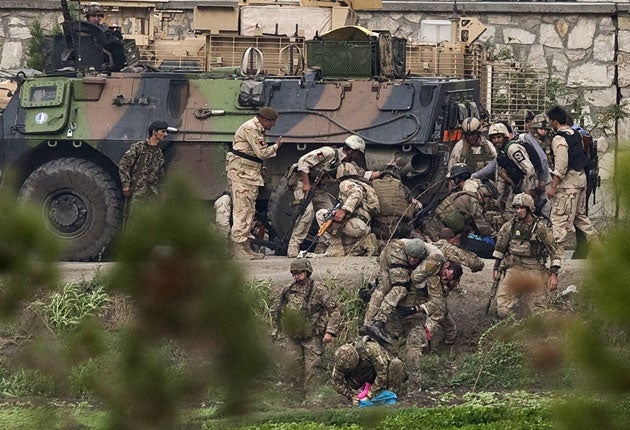US ambassador stokes anger in Pakistan over embassy attack claims

Top Pakistani and American officials are engaged in a fresh war of words as both sides trade recriminations over Islamabad's alleged support for a major militant group blamed for last week's attack on the US embassy in Kabul.
Dispensing with diplomatic niceties, Cameron Munter, the US ambassador to Islamabad, told Pakistani state radio that the Haqqani network has ties to the Pakistani state and was behind the Afghan attack. "There is evidence linking the Haqqani network to the Pakistan government," Mr Munter said. "This is something that has to stop."
Mr Munter's remarks came on the heels of perhaps even stronger accusations against Pakistan. On Wednesday, US Defence Secretary Leon Panetta warned Pakistan that Washington would do everything it could to stop militant groups operating from Pakistan's tribal areas. A senior Pakistani military official said Mr Panetta's comments constituted an "implicit" threat of invasion.
The American officials' comments have caused anger in Pakistan. Prime Minister Yousaf Raza Gilani bristled at US pressure on his country, and reversed the charge that Islamabad is not doing enough to tackle terrorism that emanates from its oil.
"Now it's time that they [the US] do more," Mr Gilani told reporters in the weekend. The phrase "do more" is widely criticised among Pakistanis as a favourite US mantra used when perceiving Pakistani action against militants as inadequate.
Earlier, Mr Gilani cancelled a scheduled visit to New York to attend the United Nations General Assembly. His office said he was staying in the country to supervise support for the millions of victims of unprecedented and devastating flooding in the southern Sindh province.
But the Pakistani media reported that Mr Gilani decided to abandon his foreign visit after US President Barack Obama rebuffed a request for a meeting on the sidelines of the UN General Assembly. If the reported rebuff is true, it would reveal the depth to which Islamabad-Washington relations have fallen in the four months since the covert US raid that killed Osama bin Laden in May.
Indeed, where officials from the two countries have met there has been no breakthrough. In Seville yesterday, Pakistan army chief General Ashfaq Kayani was confronted by the US's top military commander Admiral Mike Mullen over Pakistan's links to the Haqqani network.
Meanwhile, Sirajuddin Haqqani, the leader of the potent militant network that bears his name, said that he has rebuffed alleged US entreaties to enter into talks and will only back talks by his allies, the Afghan Taliban. Haqqani also claimed that his fighters no longer operated from within Pakistan, although US officials believe that he is based in North Waziristan along the Afghan border and the CIA has targeted the militant group with a frequent shower of drones. "Gone are the days when we were hiding in the mountains along the Pakistan-Afghanistan border," he said. "Now we consider ourselves more secure in Afghanistan beside the Afghan people."
There is much scepticism about the claim. The Pakistan army, which has long had to face accusations of hosting anti-US militants, is silent on the matter. Such a move would ease pressure on Pakistan after years of being urged to take on the Haqqanis in North Waziristan.
Join our commenting forum
Join thought-provoking conversations, follow other Independent readers and see their replies
Comments
Bookmark popover
Removed from bookmarks